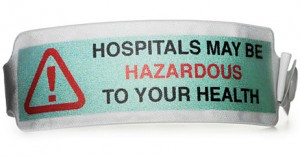 As I was traveling by car to my parent’s home in West Virginia, I was listening to NPR on the radio. I am not sure which program or even the name of the guest because of the lack of reception in the mountains, but I listened in amazement as the host and a physician discussed a study published in the September 2013 Journal of Patient Safety. The study revealed that the number of patients that die each year from preventable negligence caused by the hospital or medical provider ranges between 210,000 on the low end to over 400,000.
As I was traveling by car to my parent’s home in West Virginia, I was listening to NPR on the radio. I am not sure which program or even the name of the guest because of the lack of reception in the mountains, but I listened in amazement as the host and a physician discussed a study published in the September 2013 Journal of Patient Safety. The study revealed that the number of patients that die each year from preventable negligence caused by the hospital or medical provider ranges between 210,000 on the low end to over 400,000.
That makes medical errors the third leading killer of Americans behind heart disease and cancer.
My brain was spinning. Think of the amount of money spent to inform the public about the behaviors and foods that contribute to heart disease and cancer and the next biggest killer is the health care system itself! Naturally, my thoughts turned to training and education. Numerous studies have shown the way we train physicians is ineffective and harmful. Hours working with little to no sleep, using patients as human Guiney pigs and the volumes of information medical students commit to memory in order to seem prepared for rounds. What could possibly be the reason we continue to train doctors this way? Mostly because their teachers, the doctors in the teaching hospitals, were trained that way: a right of passage they too must pass.
How about if we applied technology? My daughter became very ill several years ago and we rushed her to the emergency room in a small rural Kansas hospital. The young ER doctor that came in to examine her had a very troubled look on her face after her initial examination. She reached into her lab coat and pulled out an iPad and began searching. I must admit I was a bit worried. Did she not remember the stuff she learned in medical school? Was my daughter so sick that she had to look up some rare condition?
The doctor saw my expression and quite frankly stated they don’t get many cases like this in their hospital and she wanted to make sure her treatment plan reflected the most recent medical developments. Although I consider myself to be a technology evangelist of sorts, I was humbled by my lack of confidence in this young doctor because she was supporting her knowledge with technology. If you have seen my presentations or keynotes, you know that I am a huge advocate of changing our education system to teach students how to acquire information instead of memorizing it, which is precisely what the actions of this young doctor exemplified.
As the doctor on the NPR program pointed out, it is not about throwing money at the problem; rather it is about a systemic overhaul of the healthcare system. Imagine what could be achieved if higher education leaders stop throwing money at their problems and start changing the way we teach.


Leave a Reply